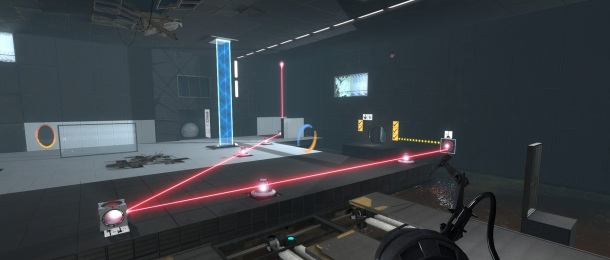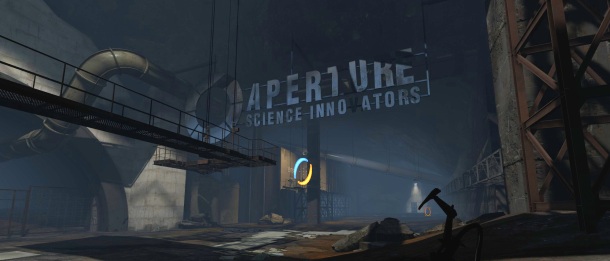
HOW DO YOU TALK about Portal 2 without spoiling it? Part of the charm of this “first-person puzzler†is finding something new or unexpected lurking around almost every corner, which makes it tough to talk about without ruining it. But now that I’ve finished the single-player campaign (twice, in fact, with a second run-through with developer commentary on), I think I’m up to it.
It’s not a spoiler to say that Portal 2 is longer than the first game. How could it not be? The first Portal – as either part of the Orange Box package or budget-priced for the PC – took about three hours on your first playthrough, maybe 90 minutes on replays. For a full price of $50-60, you’d expect Portal 2 to be longer, and it is. I won’t say exactly how long, because it’s better if you don’t know when the end is coming. Suffice it to say it’s “long enough.â€
Like the first game, Portal 2 is set partially within the traditional test chambers, and has moments where you, let’s say, “venture outside the box.†How much? How often? That’s part of the fun.
As you’d expect, Portal 2 features many of the same puzzle elements as the first game. First and foremost, this is still a game about getting from point A to point B, and Valve hasn’t tried to reinvent the wheel here, at least not completely. The portal gun works exactly as it did in the first game, you’ll still be exploiting physics to hurl yourself through space, and there’s plenty of crate-placing and platform-manipulating to keep you busy. Those are basic building blocks of the puzzles, and that hasn’t changed.
But Portal 2 also adds some significant new elements to its puzzles, more so as the game goes on. For example, a new reflection cube is introduced, which can redirect lasers to power up certain areas. Without mentioning any others, I will say that they’re all fun, although puzzles can get daunting later on when they’re all being used at once.
Most importantly, Portal 2′s puzzles remain enjoyable from start to finish. It’s a delicate balancing act trying to keep puzzle-solving interesting for the length of a full game, and I felt a little fatigue setting in near the end. But the puzzles are wonderfully crafted, and retain that satisfying quality where you go “a-ha!†when the light finally goes off and you figure out how to solve it.

It’s almost impossible to talk about Portal 2‘s story and characters without spoiling something, but they have to be mentioned, as they elevate the game into classic territory. Of course, it’s not just you and GlaDOS (who you destroyed at the end of the first game) taunting each other from start to finish. Some new characters of varying importance are introduced, and the story is wonderfully entertaining, even touching at times, leading up to an extremely satisfying ending. More than the puzzles, it’s the story and characters that people will continue talking about for years down the road.
I played the PC version of Portal 2, which worked without a hitch. I ran it at 1920×1200, never had a framerate stutter and never experienced a crash (I’m running Windows 7, for what that’s worth). And it’s a gorgeous game. It’s locked into a few color schemes due to the locations, and in fact feels darker than the first Portal, but remains a consistently attractive game to watch in action.
Portal 2 also has a wonderful co-op mode where players adopt the roles of two test robots and take on puzzles designed to be solved as a team. The game will find a online partner for you if needed, but you should really play with a friend, so it’s easier to communicate when one of you has the solution and the other doesn’t. The co-op adds some interesting tools to help you out, such as a laser pointer telling your partner where to look and the ability to switch to your partner’s view so you can see exactly what the heck he’s doing. To some extent, the co-op exists outside the single-player storyline, but I’d still recommend finishing single-player first to reduce the chance of anything getting spoiled.
A few days ago, I posted some thoughts on Crysis 2, and how I was having trouble motivating myself to finish it. I’m having no such trouble with Portal 2. It’s one of those rare games that’s impossible to put down, and you’re excited to play again once you’ve finished. I could conceivably imagine some people feeling it’s just more Portal with a new story and a few new puzzle elements, but to me, Portal 2 isn’t just the best game I’ve played this year, it’s better than any game I played last year, too. A.
Portal 2: Reviewed, Spoiler-Free
HOW DO YOU TALK about Portal 2 without spoiling it? Part of the charm of this “first-person puzzler†is finding something new or unexpected lurking around almost every corner, which makes it tough to talk about without ruining it. But now that I’ve finished the single-player campaign (twice, in fact, with a second run-through with developer commentary on), I think I’m up to it.
It’s not a spoiler to say that Portal 2 is longer than the first game. How could it not be? The first Portal – as either part of the Orange Box package or budget-priced for the PC – took about three hours on your first playthrough, maybe 90 minutes on replays. For a full price of $50-60, you’d expect Portal 2 to be longer, and it is. I won’t say exactly how long, because it’s better if you don’t know when the end is coming. Suffice it to say it’s “long enough.â€
Like the first game, Portal 2 is set partially within the traditional test chambers, and has moments where you, let’s say, “venture outside the box.†How much? How often? That’s part of the fun.
As you’d expect, Portal 2 features many of the same puzzle elements as the first game. First and foremost, this is still a game about getting from point A to point B, and Valve hasn’t tried to reinvent the wheel here, at least not completely. The portal gun works exactly as it did in the first game, you’ll still be exploiting physics to hurl yourself through space, and there’s plenty of crate-placing and platform-manipulating to keep you busy. Those are basic building blocks of the puzzles, and that hasn’t changed.
But Portal 2 also adds some significant new elements to its puzzles, more so as the game goes on. For example, a new reflection cube is introduced, which can redirect lasers to power up certain areas. Without mentioning any others, I will say that they’re all fun, although puzzles can get daunting later on when they’re all being used at once.
Most importantly, Portal 2′s puzzles remain enjoyable from start to finish. It’s a delicate balancing act trying to keep puzzle-solving interesting for the length of a full game, and I felt a little fatigue setting in near the end. But the puzzles are wonderfully crafted, and retain that satisfying quality where you go “a-ha!†when the light finally goes off and you figure out how to solve it.
It’s almost impossible to talk about Portal 2‘s story and characters without spoiling something, but they have to be mentioned, as they elevate the game into classic territory. Of course, it’s not just you and GlaDOS (who you destroyed at the end of the first game) taunting each other from start to finish. Some new characters of varying importance are introduced, and the story is wonderfully entertaining, even touching at times, leading up to an extremely satisfying ending. More than the puzzles, it’s the story and characters that people will continue talking about for years down the road.
I played the PC version of Portal 2, which worked without a hitch. I ran it at 1920×1200, never had a framerate stutter and never experienced a crash (I’m running Windows 7, for what that’s worth). And it’s a gorgeous game. It’s locked into a few color schemes due to the locations, and in fact feels darker than the first Portal, but remains a consistently attractive game to watch in action.
Portal 2 also has a wonderful co-op mode where players adopt the roles of two test robots and take on puzzles designed to be solved as a team. The game will find a online partner for you if needed, but you should really play with a friend, so it’s easier to communicate when one of you has the solution and the other doesn’t. The co-op adds some interesting tools to help you out, such as a laser pointer telling your partner where to look and the ability to switch to your partner’s view so you can see exactly what the heck he’s doing. To some extent, the co-op exists outside the single-player storyline, but I’d still recommend finishing single-player first to reduce the chance of anything getting spoiled.
A few days ago, I posted some thoughts on Crysis 2, and how I was having trouble motivating myself to finish it. I’m having no such trouble with Portal 2. It’s one of those rare games that’s impossible to put down, and you’re excited to play again once you’ve finished. I could conceivably imagine some people feeling it’s just more Portal with a new story and a few new puzzle elements, but to me, Portal 2 isn’t just the best game I’ve played this year, it’s better than any game I played last year, too. A.